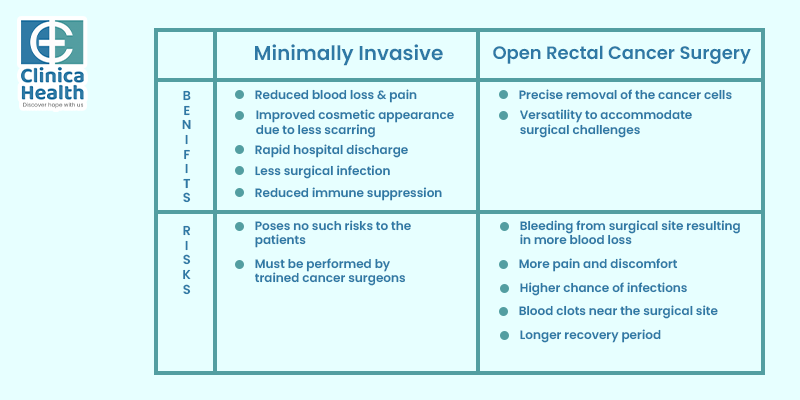-
 Call Now:
8010 552 552
7595 838 844
Call Now:
8010 552 552
7595 838 844
-
 Email Me:
[email protected]
Email Me:
[email protected]
When it comes to treating rectal cancer, surgery is the most effective way. However, rectal cancer surgery is not like other surgical interventions. It is a critical approach aimed at removing the cancerous cells from the body. Over the years, the techniques in rectal cancer surgery have evolved. In addition to traditional open surgery, oncologists are drawing towards minimally invasive procedures.
Now the type of surgery best suited for patients depends upon the individual case and is determined by the doctor. In this guide, we will compare minimally invasive and open surgery for rectal cancer to let you understand the pros and cons of each procedure as well as their respective results.
Minimally invasive procedures for rectal cancer involve laparoscopic and robotic surgery. In both these methods, smaller incisions are made through the abdomen.
In laparoscopic surgery, a laparoscope (a thin tube with an attached camera) is inserted into the abdomen which allows the cancer surgeons to get detailed images of the cancerous cells. By viewing the images, a part of the rectum containing the tumour is removed and the colon is reattached to the part of the rectum.
Now, robotic surgery is a new technique but holds significant promise. The procedure is very similar to laparoscopy except that the surgical instruments are operated by a robot which is controlled by the surgeon.
The advantage of minimally invasive procedures for rectal cancer surgery has resulted in its increasing popularity both among patients and surgeons. Its potential benefits include the following:
Minimally invasive procedures pose no such risks to the patients. However, the methods must be performed by trained cancer surgeons who have advanced skills and knowledge of the latest surgical equipment. He must be able to explain the specific techniques involved in the procedures to his patients.
Traditional or open rectal cancer surgery involves making a large incision to remove the rectum containing the cancer cells as well as some margin of healthy and fatty tissues to remove its spread to other body parts.
Open surgery for rectal cancer offers the following benefits:
The possible risks of open rectal cancer surgery depend upon the overall health of the patient before the surgery. However, some of the side effects which every patient experiences are as follows:

The right procedure for the patient will surely be decided by the cancer surgeon. However, there are determining factors used by doctors to see if patients need minimally invasive procedures or open surgery.
The choice between minimally invasive technique and open surgery is made keeping in mind the best treatment outcome and ensuring the patient’s well-being.
It is to be remembered that advances in both the procedures of rectal cancer surgery will continue to evolve in the upcoming years catering to the specific needs of the patients. You are required to consult a certified doctor who has years of experience and a high success rate of patients.